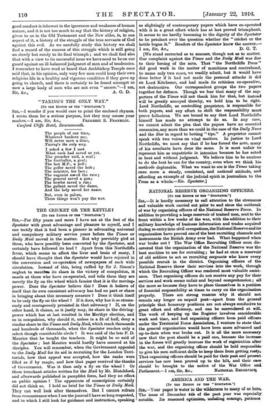THE CRICKET OR THE KETTLE ?
[To THE EDITOR or TIER " SPECTATOR.") Sm,—For fifty years and more I have sat at the feet of the Spectator with great advantage and pleasure to myself, and I can testify that it had been a pioneer in advocating universal and compulsory military service years before the Times or Daily Mail moved in the matter. But why peevishly gird at these, who have possibly been converted by the Spectator, and certainly have followed its lead 7 Apart from this Northcliffe fever, which seems to affect the liver and brain of many, I should have thought that the Spectator would have rejoiced in the conversion and co-operation of newspapers of such wide circulation. Instead of this, being ruffled by Sir J. Simon's neglect to menden its share in the victory of compulsion, it snarls at those who have co-operated, and tells them they are merely the fly on the wheel which fancies that it is the moving. power. Does the Spectator believe this? Does it believe of itself that its own consistent advocacy has had no part or share in bringing about this necessary measure ? Does it think itself to be only the fly on the wheel ? If it does, why has it so strenu- ously and courageously persisted in that advocacy ? If, on the other hand, it claims, as it justly may, its share in the driving- power which has at last resulted in the Merthyr election, and so in compulsion, why should it, unless in a fit of huff, deny a similar share to the Times and Daily Mail, which reach thousands and hundreds of thousands, when the Spectator reaches only a select though considerable circle ? It was said of the late F. a Maurice that he taught the teachers. It might be so said of the Spectator ; but Maurice would hardly have sneered at his disciples. You will remember, when the Government appealed to the Daily Mail for its aid in recruiting for the London Terri- torials, how that appeal was accepted, how the ranks were filled as if by magic, and how that paper received the thanks of Government. Was it then only a fly on the wheel ? Or those trenchant articles written for the Mail by Mr. Blatchford, and afterwards published in pamphlet form, had they no effect on public opinion ? The opponents of conscription certainly did not think so. I hold no brief for the Times or Daily Mail. They can well look after themselves, But I cannot refrain from remonstrance when I see the journal I have so long respected, and to which I still look for guidance and instruction, speaking
so slightingly of contemporary papers which have co-operated with it in a great effort which has at last proved triumphant. It seems to me hardly becoming to the dignity of the Spectator to be petulant over the question whether the " cricket or the kettle began it." Readers of the Spectator know the answer.—
[We stand corrected as to manner, though not as to matter. Our complaint against the Times and the Daily Mail was due to their forcing of the note. That " the Northcliffe Press " did good work in the matter of munitions and contraband, to name only two cases, we readily admit, but it would have done better if it had not made the personal attacks it did on Lord Kitchener, and had made its criticism co-operative, not destructive. Our correspondent groups the two papers together for defence. Though we fear that many of the sup- porters of the Times will not thank him for that, but instead will be greatly annoyed thereby, we hold him to be right. Lord Northcliffe, as controlling proprietor, is responsible for both papers, and any effort to shift the responsibility must prove fallacious. We are bound to say that Lord Northcliffe himself has made no attempt to do so. In Any case, we cannot admit the plea that the papers have no essential connexion, any more than we could in the case of the Daily News and the Star in regard to betting " tips." A proprietor cannot speak with two voices on vital matters. In justice to Lord Northcliffe, we must say that if he has forced the note, many of his assailants have done the same. It is most unfair to represent him as unpatriotic in intention because he has acted in heat and without judgment. We believe him to be anxious to do the best he can for the country, even when we think his methods deplorable. What we want to see is the Times taking once more a steady, consistent, and national attitude, and affording an example of the judicial spirit in journalism to the Press as a whole.—En. Spectator.]


































 Previous page
Previous page